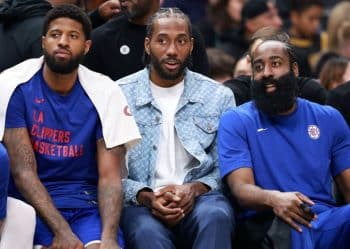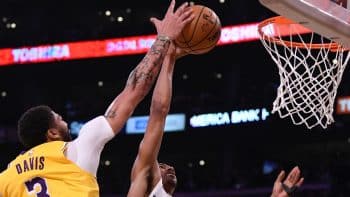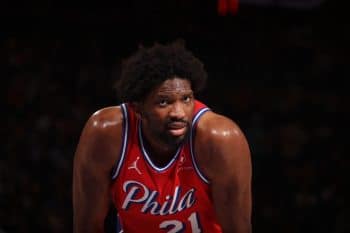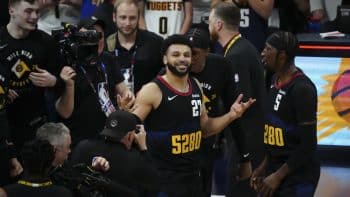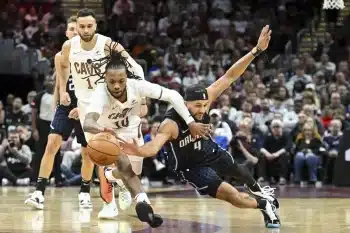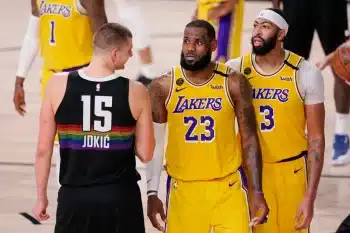NBA
Knicks, Bulls Should Talk ‘Melo Trade

The New York Knicks hired Phil Jackson as president to make the difficult decisions as the franchise looks to rebound from a down season.
Carmelo Anthony is expected to become the top free agent on the market this summer, presuming he opts out of the final year on his contract at $23.4 million.
The Chicago Bulls are one of the top defensive teams in the league, but are in desperate need of an elite scorer (along with a healthy Derrick Rose).
It could be in the best interest of the Knicks, Bulls and Anthony to work out a trade before the All-Star forward ever hits free agency in July.
Should the Knicks reinvest in Anthony?
At 30 years old, Anthony is looking at one final, massive contract. If he opts out of his deal with New York as expected and re-signs for a five-year maximum deal, Anthony is eligible for a contract worth up to $129 million over five years.
Jackson recently told reporters there’s “a precedent that’s been set,” with star players recognizing “to put together a team with enough talent, you’ve got to have people making sacrifices financially.”
“We hope that Carmelo is true to his word,” said Jackson of the possibility that Anthony could re-sign at a discounted rate.
The Knicks have no picks in the June 26 NBA Draft. With high-paid players like Amar’e Stoudemire, Tyson Chandler and Andrea Bargnani, the Knicks won’t have cap room this summer.
Is Anthony truly willing to give up money to be a part of New York’s rebuild, waiting for the summer of 2015 when players like Kevin Love, LaMarcus Aldridge, Marc Gasol, Rajon Rondo and possibly LeBron James could be available?
What do the Knicks do if Anthony is demanding too much, limiting the team’s financial flexibility?
Too high a price for Anthony might only extend New York’s recent mediocrity.
Anthony’s Quandary
If Anthony is willing to take a smaller contract from the Knicks, why not take the same wage from a team in closer reach of an NBA title?
There’s a difference in what another team can offer in free agency. A four-year, $96 million deal pales next to $129 million from the Knicks — but that’s irrelevant if the franchise doesn’t make that large of an offer.
The difficult part for a contending team is opening up the $22.5 million in cap space in July to give Anthony the max. That may be a non-starter come July.
If the All-Star forward was willing to take a deal starting at $15 million, the Knicks would be able to pay him $86.3 million over five seasons — a new team would still fall short financially, at $64.1 million over four.
Can the Bulls Afford Anthony?
According to the Chicago Sun-Times, Bulls center Joakim Noah has been recruiting Anthony, with the caveat that the team doesn’t give up forward Taj Gibson to get a deal done.
The Bulls held teams to just 91.8 points a game this past season under the direction of head coach Tom Thibodeau. Without Rose, the Bulls just couldn’t score enough in their first-round loss to the Washington Wizards.
Even with Rose, one Bulls executive recently noted to Basketball Insiders that the team doesn’t have enough firepower to get past the powerful Miami HEAT.
Anthony makes a lot of sense for Chicago this summer, but how can they open up enough cap room to spend more than the Knicks are willing to invest?
The NBA projects the salary cap will climb to $63.2 million for the 2014-15 season. Even if Chicago used their one-time amnesty on Carlos Boozer, the team will have just $11.3 million to spend.
If the Bulls trade away both of their first-round picks (their own at 19 along with 16 from the Charlotte Bobcats), while leaving Nikola Mirotic (23rd pick in 2011) overseas playing in Spain — Chicago would still only have about $13.5 million in cap space.
The more Chicago gives up to make room (as in both forwards Gibson and Boozer), the less it makes sense to acquire Anthony.
The Solution
The Bulls would need to send out approximately $17 million in salary to acquire Anthony’s $21.4 million contract before July — but such a move is only legal if Anthony opts into his $23.3 million salary for 2014-15.
Carlos Boozer’s $15.3 million would be the primary player going from Chicago to New York. The Bulls never go under the cap this summer and avoid paying Boozer $16.8 million not to play (via amnesty); the Knicks add a player whose contract expires before 2015.
None of the late-signed players on Chicago’s roster are eligible to be traded until July (Ronnie Brewer, Mike James, Greg Smith and Lou Amundson). Still $1.7 million short of a workable deal with the Knicks, the Bulls would have to include either Mike Dunleavy ($3.2 million) or both Jimmy Butler ($1.1 million) and Tony Snell ($1.4 million).
Dunleavy is set to earn $3.3 million next season, his contract also ending prior to 2015.
A package of Boozer, Dunleavy, two 2014 first-round picks (16 and 19) and perhaps a future first should be a workable package for both the Knicks and Bulls.
If the Knicks have accepted that the investment in Anthony is too limiting at the price, they’re adding on multiple draft picks while taking on salary that doesn’t hinder their goals beyond next season.
Dunleavy had a nice season for the Bulls, but Anthony fills a greater need. If Chicago is pressing to win with their current core, the draft picks shouldn’t be as great a priority.
Should the Knicks try to acquire Mirotic as price for Anthony? Absolutely, but then the Bulls should do their part to try and keep the rights to one of the top players in Europe.
Ultimately, Anthony has all the power as any pre-July trade requires a contract opt in. If he doesn’t, Anthony hits free agency and controls his own destiny. New York risks losing an All-Star in his prime without compensation — there’s a limit to how much leverage the Knicks have in this situation.
Anthony can also negotiate an extend-and-trade as part of the deal, adding on approximately $50.1 million for two additional seasons in Chicago — locking him in through the 2016-17 season.
Another option for Anthony in Chicago is inking a three-year extension (six months after a trade from the Knicks to the Bulls) for an additional $79 million.
While none of the choices match a five-year, max deal with the Knicks — if New York isn’t offering $129 million, what is Anthony giving up?
New York can certainly explore other pre-July trades, although not many teams have the ability to construct one — and all would have to be on Anthony’s list given his necessary compliance via the opt-in.
Perhaps a deal built with the Houston Rockets around Omer Asik, Jeremy Lin and Chandler Parsons might appeal to New York. Both Asik and Lin are expensive, making $15 million apiece next season (although their cap numbers are just $8.4 million each, dating back to how Houston initially acquired the duo as restricted free agents).
Anthony’s list of options might expand in free agency but then teams like the Los Angeles Lakers may not be willing to over-invest in the All-Star. The Phoenix Suns and Dallas Mavericks may also have enough cap room to chase Anthony in July, among others.
